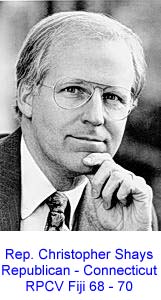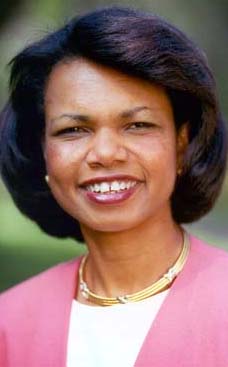
Shays, who has made 10 trips to Iraq, embedded with missions from Mercy Corps, Save the Children and other groups, said the Iraqi people "want us to stay." On previous occasions Shays has been asked if he wears a bulletproof vest on his fact-finding missions. Reports indicate the vests are in short supply and some have been found to be deficient and, as a result, GIs have died. "I wear what I am told (by the military)," Shays has responded when asked about that. Congressman Chris Shays of Connecticut served as a Peace Corps Volunteer in Fiji in the 1960's.
Constituents Play Hardball with Shays at Town Meeting
Constituents Play Hardball with Shays at Town Meeting
By PATRICIA Mc CORMACK HYPERLINK mailto:pmccormack@bcnnew.com pmccormack@bcnnew.com
The standing-room-only crowd in the Town Hall Meeting Room Saturday morning peppered U.S. Rep. Chris Shays, R-4, with questions some obviously discomforting to the solon in his 19th year of service for an eclectic and electric 60 minutes. The smorgasbord included inquiries about gasoline and heating oil prices, plus the "outrageous" hike in electric company bills, happenings that are ripping family budgets and shooting up the cost of running town governments. Questions came hardball fashion, interspersed with softball ones such as "why is my Social Security check taxed?" and nice ones, like praise for doing a good job throughout his lengthy service.
The sternest questions sprung from concerns over the Patriot Act, President Bush's spying powers, torture of captives, corruption in Congress, the Iraq War and its human and financial toll. The meeting on a sunny and not overly cold day took place as Shays entered the homestretch in a two-weekend marathon of community meetings with constituents in the 20 lower Fairfield County towns he represents in the nation's capital.
Softball questions appeared to come mostly from Republicans in the bipartisan assembly; hardball, from Democrats. Critics of the Iraq War appeared on both sides of the political fence. Among under-voting-age critics was a high school student who did not identify herself but who asked Shays, "What kind of a country will I inherit when I am 35 based on your leadership?" The congressman promised, "I'll get back to you." He nodded in her direction where other high school students were sitting and said young folks who come to his community meetings get extra points for getting up early on a Saturday morning.
Juan Davis, a senior at Greenwich High, didn't get to ask a question but he passed out a printed plea that Shays and others in Congress support "The Dream Act." This would give hard-working Americanized students "green cards" so they will not be deported as "illegals" after finishing high school. Davis told the Greenwich Citizen he is in that category. He and others like him are lobbying Congress so pending bills the so-called Dream Act bills will become law and allow them to go on to college instead of being deported upon high school graduation.
Davis said he is among hundreds of undocumented high school students in Connecticut whose parents brought them to the United States when they were 3, 6, 9 or 12 years old. "Although we are Americans in the way we think, act and speak, we don't have immigration papers to be here and face deportation at the end of high school," he said. "The Dream Act will allow us to attend college. Now, most colleges don't give a glance at an applicant if he or she is undocumented." The case of another young constituent, Soldier Andrew Cragg, 27, a 1996 graduate of Greenwich High, was made by his father, Austin Cragg.
The senior Cragg told Shays that his son, who enlisted in the Army in September and is shipping out to Iraq in February from Fort Hood, Texas, has not been supplied with all the gear he is supposed to have. "He has had to spend more money than he is paid a month in the Army to get all the things on a list he was given," the soldier's dad said. "For one example, his fatigues are the wrong color and he had to buy the right color for the desert," he said. "His duffel bag isn't the right size. And he had to buy one. And so it goes."
Cragg indicated he had to pony up money so his son could be properly supplied. "I want to know why this is so," he told Shays. The congressman asked the dad to give the information to his aides and that he will check into the situation. He assured soldier Cragg's dad he had a just point. That exchange came out of left field. So did one described by constituent Bill Schneider, who told Shays he thinks things are bad when "the National Guard" has to resort to "Pizza Box" recruiting tactics.
He held up the lid from a Hamilton Avenue pizza box with a dual message. On one side a young lady, in civilian threads, is asked, "Worried about college tuition loans?" On the other side, the young lady is shown in Army desert tan fatigues, smiling broadly. The message included, "We'll pay off your college loans." The pitch promises to pay for college tuition in the future, too. The hook: "JOIN THE NATIONAL GUARD."
The Cost of War
The cost of the war, financial as well as in the loss of lives, was in the top 10 among questions. Former First Selectman Dick Bergstresser, a Democrat, was among those who wanted to know how the trillion dollar-plus bill will be paid without shorting domestic programs or raising taxes drastically. Shays had a two-word response: "With bonds." Some wondered aloud: "Where are the war bond drives such as those in World War II?" There was also a cluster of questions regarding President's Bush's spying powers as "Commander of Chief" in wartime.
The Patriot Act
up for renewal shortly
is particularly irksome because it gives Uncle Sam's sleuths power to look at library records of suspects. "I would sooner lose the election (to Diane Farrell in November) than not defend the Patriot Act," Shays said. He related that if the 20th member of the al-Quada crew that attacked America on 9/11 had his library take-outs and computer records reviewed, evidence of the plot would have been detected in time to abort the lethal plans..
Shays contends the FBI was on the suspect's trail but did not have time to get all permissions needed to do the check. Shays cites this as a best-case scenario for The Patriot Act's widening snooping rights for investigators. As for President Bush and his broadly based powers as commander-in-chief during war to tap a suspected perpetrator's phones and such, Shays says it is part of the President's constitutional duty to protect Americans. A hearing in is in the wings on the topic of presidential powers in wartime, Shays contends.
John Howard told Shays it is time to get control over the National Security Agency (NSA) wire tapping and those broad investigative powers bestowed by the Patriot Act. "The questions are, should the NSA be spying on us and should the President be allowed to scare us?" he asked. "If we don't like thinking now the President is scaring us by spying on us, just think how scary it might be in five years when Hillary (Clinton, as president) controls the spying." Other fears were expressed by questioners that the "war" is showing signs, a la the Vietnam War, of taking on a life of its own a frustrating and seeming endless course.
Shays, who has made 10 trips to Iraq, embedded with missions from Mercy Corps, Save the Children and other groups, said the Iraqi people "want us to stay." On previous occasions Shays has been asked if he wears a bulletproof vest on his fact-finding missions. Reports indicate the vests are in short supply and some have been found to be deficient and, as a result, GIs have died. "I wear what I am told (by the military)," Shays has responded when asked about that. Meanwhile, other questions centered on energy and the environment. Folks urged Shays to push harder for conservation of gasoline and to stem Big Oil company price gouging that is fleecing family budgets.
He also was told gasoline engine exhaust pollution is eating away at the ozone layer, causing global warming. Tom Baptist, Audubon Connecticut president, was among those faulting the lack of action in Congress on the conservation front. He predicted that unless use of gasoline is curtailed, the future of life on planet Earth will be threatened. "What happened to the conservation programs of the '70s?," he asked as he complained about harm from proliferation of gas-guzzling SUVs and pickups on the roads. Shays responded that he's been pushing for conservation for years.
There was no easy answer, however, for the question from Mike Fox, executive director of the Connecticut chapter of the Gasoline Automotive Services Dealers of America (GASDA). He wanted to know what Shays can do to stop the big oil companies such as MobilExxon and Shell from holding back supplies to "create false shortages" and force up prices. There was an urgent tone in Fox's voice when he asked: "What can you do to punish oil companies for creating false shortages?" Shays had no short or long answer in hand or on the tip of his tongue but promised to look into the situation. He added that energy and environment problems are linked.
"If we keep up consuming energy the way we are, we won't have a world to live in," Shays said. "We've got to consume less and not waste it." Shays said he is in favor of setting a goal of 40 miles per gallon vehicles in 10 years. Meanwhile, Bergstresser told Shays: "The trouble is we have no energy policy in this country." An icon jazz musician, saxophonist Bennie Wallace, set Shays back by declaring, in passionate fashion: "I am ashamed of my country." At the outset, Wallace told Shays
"I disagree with you about the war." He also says that as he travels the world he finds wide disagreement with America's policies on spying, torture of captives and the war in general.
"I'm shamed of my country for torturing, for spying. I like you, Chris, and I have voted for you in the past, but people are dying." Shays responded: "I am proud that my country is introducing democracy in the world. But I fully accept your comments. I know they come from your heart." Meanwhile, Fred Camillo, chairman of the Greenwich Republican Town Committee, asked what he thought about the forum, told The Citizen: "You would think from what was said that President Bush lost the election by 10 or 15 percent." In a nutshell, comments of others suggested that Shays "is not afraid to tell the truth as he knows it, and that he does not fold in the face of opposing views."

















